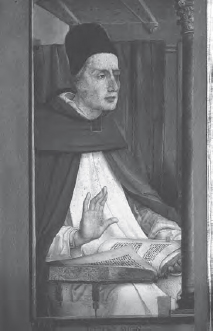Neoplatonism Through the RenaissanceOther Important Medieval Philosophers |
How was John Duns Scotus’ work different from Thomas Aquinas’? |
John Duns Scotus (1266–1308) was not opposed to Aquinas (1224–1274), but he brought St. Augustine’s (354–430) thought into philosophical and theological conversations that were largely dominated by interest in Aristotle. Duns Scotus also drew on Avicenna’s (c. 980–1037) notion of unified being in his idea of God as Infinite Being, who had appeared to Moses as “I am who am.”
Duns Scotus lectured at Oxford, Paris, and Cologne, where he taught that God had created each individual being with a unique nature or “haecceity.” Duns Scotus thought it was the will and not the intellect that is rational, because the will can will either one thing or its opposite. The will has both an intellectual appetite for happiness and self-actualization and a desire to love things based on their inherent value. These aspects of the will incline us to love God for our own good and also because he is God. Duns Scotus introduced a new idea of “intellectual intuition,” a kind of awareness that enables us to be certain of our own thoughts, and in the afterlife, be in the direct presence of God.

